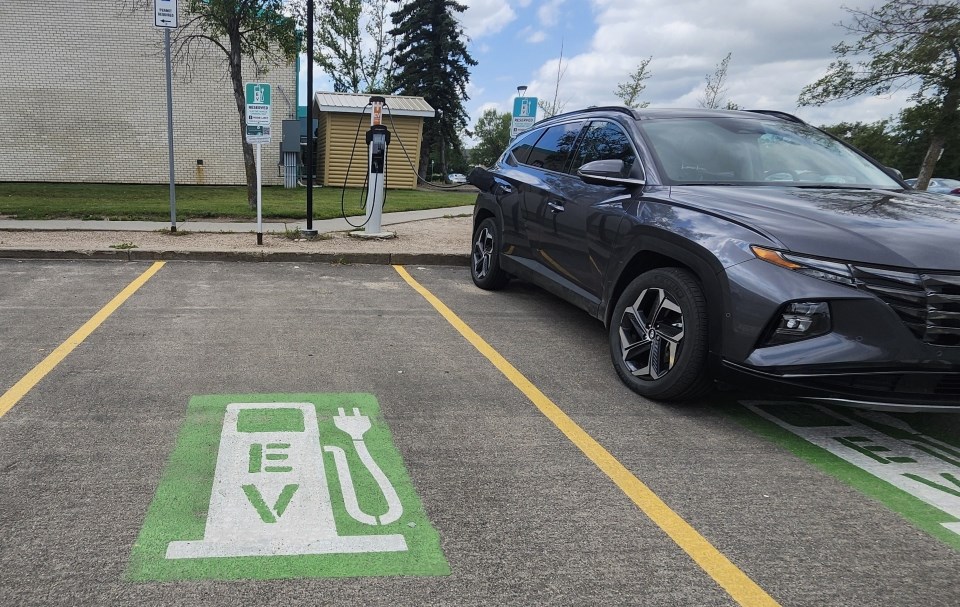SASKATOON — Known climate activist Glenn Wright sees the city’s decision to have electric vehicle owners pay whenever they use the two city-operated EV charging stations, calling it a blow to Saskatoon’s Climate Action Commitment.
Wright, whose family lives about 40 kilometres from the city, said that they have transitioned to EVs since they offer several benefits over fuel-powered vehicles, including lower maintenance and operating costs, greater convenience with home charging, and better environmental impact.
He expressed his opinion after the City Council’s Environment, Utilities, and Corporate Services Committee on Tuesday, Aug. 5, voted to end the no-user-fees program for EV owners when charging at the city-operated stations at Lakewood and Lawson civic centres.
Wright, in an email to SaskToday, criticized Saskatoon’s decision to end its free charging pilot program, calling the new $5.35 per hour user fee at two civic centres “unreasonably high” and a blow to the city’s own climate goals.
The free EV charging pilot program was launched in 2023 to encourage people to transition to using electric cars. The new fee, pending final council approval, could be implemented within two months. A progress report is expected in a year.
“Those chargers will not be used very often unless folks are in an ‘emergency’ situation. This rate is misguided. Sensible and progressive municipalities appreciate that we have limited charging infrastructure and want to entice people to switch to electric vehicles,” said Wright.
“I get the sense that the city is more concerned about cost recovery than trying to promote electrification of transport or implementation of the Low Emissions Community Plan. It seems desirable for all that we encourage electrification of transport.”
He said that part of promoting the use of EVs is to make charging the vehicles accessible to the public, and not charging exorbitant rates is in anyone’s best interests, adding that he has used the chargers at Lakewood and tried the chargers at Lawson.
“But the Lawson chargers have always been in use by others whenever I pull up. Note, I have never needed the chargers, but merely wanted to test them. Participate in the trial program, or get free power while I have time to kill in the city,” said Wright.
“Right now, many people live in multi-unit residential with no ability to charge their cars, except that some may have access to level 1-120V 15Amp. Why not make the Civic Centre chargers available via membership or enrolment to those who need them?”
Wright is particularly concerned about how the decision could impact people living in apartments or condos, who often don’t have access to home chargers. Instead of applying a flat rate to all users, he suggests the city explore equitable alternatives.
He added that an income test should be done for those who might need to use the charging stations at the Lakewood and Lawson Civic centres, or those who have no access to a Level Two charging station, or something similar.
Wright provided an example of his experience at the Lakewood charging station to test the pricing mismatch. He received 4.3 kWh of energy over 44 minutes, enough for roughly 28 km of driving. Had he paid the proposed rate, the cost per kilometre would have been about 14 cents/km, nearly 1,000 per cent higher than the home charging rate of 1.5–3 cents/km.
“You wouldn’t normally expect to see that kind of cost for public Level Two charging. That kind of pricing is typical of high-speed Level Three charging, where you’re paying for convenience. I also worry that the charging cost is so high that the city’s idea of cost recovery may backfire as the usage will drop off significantly,” he added.
Wright compared the city rate unfavourably to a high-speed charger he used recently in Rosthern, where he paid around $4 for 8kWh, half the cost per kWh compared to the city’s new structure. He warned that this kind of blunt pricing policy could stall progress on the city’s Low Emissions Community Plan, which includes electrification of transport as a key strategy.




